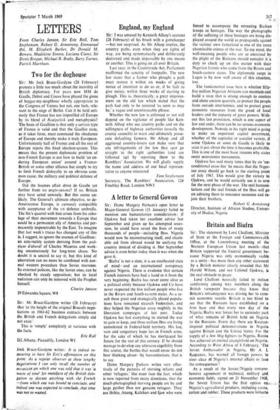A letter to General Gowon
Sir : Dame Margery Perham's open letter to Major-General Gowon (31 January) failed to mention one humanitarian consideration : if Ojukwu had taken her excellent advice last September and given up his attempted seces- sion, he could have saved the lives of many thousands of people—including Ibos. Nigeria would now be reconstructing itself, and charit- able aid from abroad would be unifying the country instead of dividing it. Her September advice is even better today than it was when she gave it.
'Biafra' is not a state, it is an overheated state of mind—and an international conspiracy against Nigeria. There is evidence that certain French interests have had a hand in it from the very beginning. Biafra has never come alive as a political entity because Ojukwu and Co have never respected the five million people who live in the Rivers and South-eastern states. As a re- sult these great and strategically placed popula- tions have remained staunch Federalists, and they helped the Nigerian army mightily in the liberation campaigns of last year. Today Ojukwu has lost everything he started the war to gain or keep, and three million lbos are living unmolested in Federal-held territory. His last, vain and sanguinary hope lies in French arms, for the sake of which he has mortgaged his future for the rest of this century. If he should manage to develop any offensive capability from this source, the battles that would ensue do not bear thinking about—by humanitarians, that is to say.
Dame Margery rerham writes very effec- tively of the pictures of starving infants and other 'refugees.' She must face the fact, which is now reported from many directions, that the much-photographed starving people are by and large neither Ibos nor genuine refugees. They are lbibio, Anang, 'Calabar' and "jaw who were
forced to accompany the retreating Biafran troops as hostages. The way the photographs of the suffering of these hostages are being dis- played around the world as propaganda against the victims' own fatherland is one of the more
abominable crimes of the war. To my mind, the well-meaning people who are so exercised by the plight of the Biafrans should consider it a duty to check up on this matter with their Nigerian friends who come from the Rivers and South-eastern states. The diplomatic corps in Lagos is by now well aware of this situation, too.
The fundamental issue here is whether fifty- five million Nigerian Africans can maintain and build a state that is strong enough to contain and abate ancient quarrels, to protect the people from outside interference, and to protect great economic resources from the greed of local leaders and the rapacity of great powers. With- out this last protection, which is one aspect of law and order, there can be no serious economic development. Nobody in his right mind is going to make an important capital investment, whether of the capitalist or socialist variety, if some Ojukwu or some de Gaulle is likely to seize it just about the time it becomes profitable. This is one of the most basic reasons why states resist secessionist movements.
Ojukwu has said many times that by an 'un- conditional cease-fire' he means that the Niger- ian army should go back to the starting point of July 1967. This would give the victory to Ojukwu, and he would certainly use it to arm for the next phase of the war. The real humani- tarians and the real friends of the Ibos will go on advising them to renounce secession and re- join their brothers.
Robert G Armstrong Director, Institute of African Studies, Univer- sity of lbadan, Nigeria


































 Previous page
Previous page